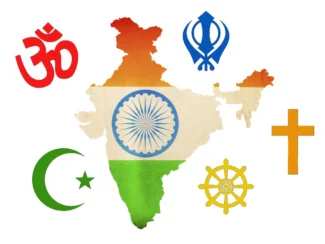~ Tejas Bobe
India is a land of over 1.3 Billion people, all with different religions, languages, ideologies, and perspectives. Often, these differences lead to tension between people of other sects. Historically, this has been of the significant problems that lead to discrimination against individuals in India. But, in recent times, incidences of discrimination are rising in India, resulting in increased communal violence. At a time when religious intolerance is seeing its peak in India, one can’t help but wonder: how did it come into existence in the first place?
Religious Ideologies
India’s current state is that it is grasped in the clutches of a never-ending battle between different religious ideologies for supremacy and upholding their beliefs as the ‘ideal one’ for the masses. Looking at it, one cannot avoid but wonder where we can trace back its roots and whether it can lead to a positive outcome. But we must realize that being discriminated against based on caste, creed and religion isn’t a modern phenomenon but has been in existence for centuries. Over the course of thousands of years, we have come to a point where it has ultimately become a part of our system, culture, traditions, and society.
Historical Background
The history of casteism in India can be traced back to thousands of years, rooted in the Indian Caste System. In ancient times, society was divided into different ‘varnas’: the Brahmins, Kshatriya, Vaishya, and Shudra. Initially, this division was based purely on the occupation of the individuals. But, as the system became hereditary, the upper castes started depriving the lower classes of social benefits. This resulted in discrimination against the lower classes, which grew on to become a social norm. The Dalits became the untouchables and were the ones most severely affected, making their life miserable. The treatment endured by them was carried on generations after generations with no one to question the authority in the true sense. This age-old tradition carried for thousands of years, affecting India’s vast population, creating a mindset of the upper class’s dominance.
The situation worsened when different religions started getting their ground in India due to centuries of invasions and immigration. Bharatvarsha, which was entirely dominated by, and under the reins of Hindu kings, witnessed the influx of other religions. This created differences in opinions among the people, which led to the division of society. The majority had the upper hand in all the central governance and decision-making, making them even more powerful. Over the years, this created an environment for the minority’s oppression and eventually had them dominated the vast majority. One cannot oversee the fact that inequality does not exist only between the different religions, but it is also profoundly stuck among the sections making up the religions.
Constitutional Reforms
Many reformers over the centuries have tried to abolish inequality in India. Finally, after years of tyranny and suffering, India’s Constitution was adopted, which granted equal rights and power to every citizen irrespective of their caste, creed, and religion, thus aiming to create a balanced society. Under the guidance of Dr Babasaheb Ambedkar, India’s Constitution granted reservations for India’s weaker sections, i.e., the minorities. This guaranteed representation of every society in places like education and the government and equal civil and political rights. This was a groundbreaking decision of the time, as the weaker sections got equivalent representations. This has, over the years, helped in uplifting many people from poverty to progression. However, what started as a temporary reservation ended getting deeply rooted in the society, just like the discrimination. This has resulted in people being dependent on the reservations for representation instead of getting it based on their skills. This results in a lacklustre society, wherein people no longer try to be good at something; they wait for someone or something else to help them. This is another factor that halts people from development, but the people have largely ignored it.
The Toxic Significance of the Religious culture
A change could be brought upon people Constitutionally, but the hard part was to uproot the beliefs that were sowed into the people’s minds since the beginning. Even after over 74 years of independence, India still has its foot stuck in the bog of inequality. Even today, we come across nerve-wracking instances where a person was subjected to inhuman treatment beyond belief just on the sole reason that he belonged to a caste disgusted by a few of the so-called upper classes. The backward and poorly developed regions of India are still living in a society where a particular community uses another one as a ladder towards their goals to make sure they stay at the top of the hierarchy. This disharmony among ourselves has bound us from reaching great heights of success and achievements: both individually and as a country. People are so engrossed in pulling their religious counterparts down that they forget to create a positive effort towards development and thus goes on the never-ending loop.
Conclusion
In the end, we, as the citizens of such a diverse nation should come to realize that the wellbeing of the nation comes before any individual, community, or religion. We must honour the uniqueness that lies amongst us all, forget our differences and come together as the citizens of the great country that India is and create a world where an individual is honoured and looked up for his efforts and qualities rather than his generational identity. Let’s unite to achieve a single common goal: take India back to its past golden glory.
Learn more about: The different theological history behind Diwali and its myths.


